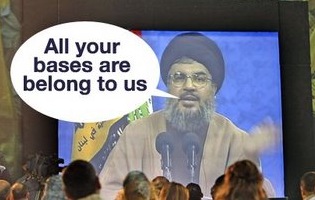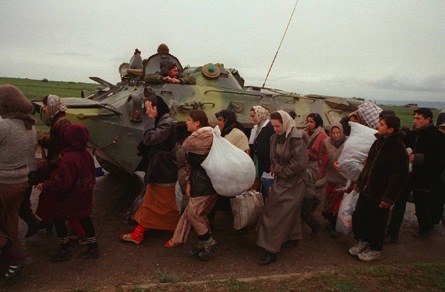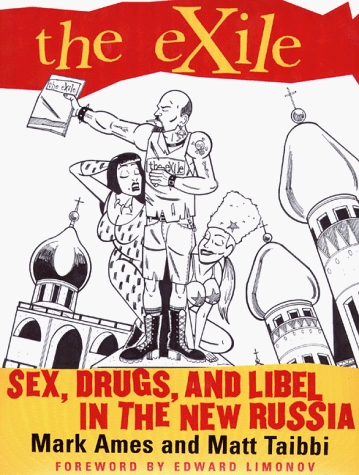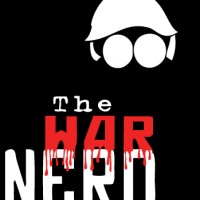Hezbollah explains ‘Arab Spring’ to residents of West Beirut
Now that the Beijing games have wound up, we can get on to a sporting event with real significance: a Neocon Olympics to decide the most grossly wrong, stupid prediction by a Neocon pundit post-Iraq. Of course, it’s a very rich field. Being totally wrong about absolutely everything is the Neocons’ job, and they’ve been working overtime on it. Their proudest moment had to be in the lead-up to the Iraq war when Kenneth Adelman assured America that democratizing Iraq would be “a cakewalk.” Indeed, early Neocons like Adelman and Richard Perle (who predicted that Iraq would settle down “at the first whiff of gunpowder”) set the bar for disastrously wrong predictions so high that some have suggested that the trophy be retired in their honor. But doing that would mean shutting out all the more recent Neocon predictions. Their little mistakes may not have cost as many trillions of dollars and thousands of lives as Adelman and Perle’s, but give them time. They’re doing their best to push us into more disastrous wars, and with team spirit like theirs, they may yet succeed. Here are the top contenders:
1. “The Arab Spring Is Happening Now” by Abe Greenwald, Pajamas Media.
There are many unintentionally funny aspects of this April 13, 2008, article, such as the fact that two of the countries Greenwald cites approvingly, Turkey and Pakistan, aren’t Arab at all. But as with all good comedy, it’s the timing that makes this article such a winner. To see the joke, you have to remember that Neocons have been predicting an “Arab Spring” for years, in which democracy, once we’d introduced it to Iraq, would spread like a weed all over the Middle East.
Greenwald acknowledges that he and his friends were wrong to claim that “spring” would happen in 2005, but, he assures his gullible readers, they were just a little premature. It’s coming right now, he gushes, that blessed spring — it’s just a little late. Democracy is busting out all over, especially in Lebanon! The article’s subhead cited Lebanon’s “Cedar Revolution” as a sure sign of spring — the first Arab robin of the Arab spring, as it were — and the story featured a photo of a Lebanese woman wearing face paint in the shape of the Lebanese national flag. Now the punch line: Less than four weeks after the article appeared, the pro-Syrian Shia militia Hezbollah took over West Beirut, the wealthy seaside district that harbored most of the overpublicized “Cedar Revolution” demonstrators who were the basis of Greenwald’s prediction. What made the takeover particularly demoralizing for the Neocons, who regard Iran-backed Hezbollah as Hitler-by-proxy, is that none of the local militias offered more than token resistance. Hezbollah literally walked through Beirut to the sea without meeting resistance, destroyed a TV station that had broadcast hostile stories, and, after its demands were met, walked back out again. The Arab Spring was indefinitely postponed; the Arab groundhog had seen his shadow.
Of course, this wasn’t about “democracy,” nor was it the disaster the Neocons claimed it was. Hezbollah represents the Lebanese Shia, the poorest and most despised ethnic group in the country. Their victory isn’t necessarily bad news unless you’re dishonest enough to pretend that the wealthy West Beirut elite that shows up to those “Cedar Revolution” rallies that get so much Western press really represent “democracy.” They didn’t care much about democracy when it was the Shia who were being excluded for generations from the Lebanese polity, and they don’t care about it now. Their goal is to maintain their privileged position; no more, no less. What Hezbollah’s victory meant was that a new power, hostile (for very good reason) to Israel and the United States, had triumphed — and that Neocon prognostications had been wrong again. And not just wrong, but comically wrong — so ludicrously wrong that in any other country in the world, someone guilty of such a disastrous misreading would be banned for life from the press. Not here, though; Greenwald continues to make stunningly foolish pronouncements every week. Punishment is reserved for those, like weapons inspector Scott Ritter, who dare to be right when all the Neocon pundits are wrong. For being right about the fact that Iraq had no WMDs, Ritter was subjected by Pajamas Media to a classic right-wing character assassination, “Scott Ritter: Anti-War Problem Child.” That hit piece appeared on May 3, three weeks after Greenwald predicted the coming of the Arab Spring and three days before Hezbollah took over West Beirut.
2. “Hail Mauritania!” by James Kirchick, Weekly Standard.
Kirchick may not be the most famous Neocon, but in one obscure column he encapsulated their key trait: arrogant predictions, based on total ignorance, which prove to be disastrously wrong. Iraq, of course, is the classic example. On May 7, 2007, Kirchick wrote a cheery, optimistic column called (believe it or not) “Hail Mauritania,” in which he gushed that democracy had “bloomed” in this “remote corner of the Arab world” because they’d held “democratic elections.” Then history supplied the punch line: Three months later, on Aug. 6, the Mauritanian army overthrew the winner of that glorious election, and democracy had suddenly un-bloomed. To date, Kirchick has not commented on that unexpected and irksome twist. Kirchick wasn’t just unlucky in his prediction; it was absurd from the start. Nobody who knew anything about Mauritania could have imagined that simply because the local elite had cynically embraced the facade of American-style elections, the country would suddenly transform into a peaceful democracy. Only willful ignorance could sustain that notion. Obama is right; these people really are “proud to be ignorant.” In fact, they’re desperate to remain ignorant, especially about the fact that elections, in themselves, mean very little.
Weekly Standard’s dream for Georgia
Fetishizing elections as good in themselves is a common Neocon fallacy. They’re a long way from understanding what Iraq expert Nir Rosen meant when he warned after the 2006 elections in Iraq (another false dawn that had the Neocons crowing until their cheers were drowned out by IEDs going off) that “democracy is more than just a formal process, it is a culture.” Pundits like Kirchick actually believe that by stepping into a polling booth, residents of an impoverished tribal country like Mauritania will be magically transformed into responsible citizens on the Western model. To maintain this illusion, one must be willfully ignorant — though I suspect that took little effort on Kirchick’s part. For example, in “Hail Mauritania,” he identifies one candidate, Ahmed Ould Daddah, as “a prominent economist,” but doesn’t mention that Ahmed also happens to be the half-brother of Moktar Ould Daddah, the dictator who ruled Mauritania in pure authoritarian style from 1961 until he was ousted in a 1978 coup. Coups are in fact the standard method of changing administrations in Mauritania, and it is not at all clear that this bloodless coup was any less “democratic” than the grotesque, graft-fueled circus that is a U.S. presidential election. It was soon clear that to the Mauritanians, nothing untoward had occurred.
The BBC noted that two-thirds of the country’s legislature quickly backed the coup, and another BBC report noted that the population took the coup “in its stride.” With wonderful hubris, Kirchick insisted that “publicizing the good news out of Mauritania should be an urgent task of the State Department.” I wonder if he feels the same way about me publicizing the fact that democracy, as he calls these farcical elections, lasted exactly three months. Of course, the real question with any Neocon writing about Mauritania is, why does he even pretend to care? To state the obvious: Nobody at the Weekly Standard cares about Mauritania, any more than they care about the Iraqis they’ve “helped” by killing hundreds of thousands of civilians and by destroying Iraq’s infrastructure. Neocons don’t give a damn about any of these people. They simply want all Muslims neutralized; it’s all one to them whether it’s done by democratizing them or destroying their countries. And Mauritania is so obscure it doesn’t even need to be neutralized. It matters only because it offers another “hopeful sign” to be applied to Iraq, the real topic. Kirchick makes this very clear:
The Mauritanians’ success — notably, on their own terms and with little foreign intervention — at establishing the basis of a democratic society in a country that formally outlawed slavery only in 1980, should serve as a challenge to those who claim that democracy is bound to fail in the Arab and Muslim world. Now Iraqis and others can look to the west coast of Africa for an example of Arab liberalism in action.
Of course, it’s ridiculous to imagine that Iraqis would look to a backwater like Mauritania for inspiration; it would be like scolding a Parisian with, “Why can’t you be more like Albania?” But the most bizarre and typical feature of Kirchick’s argument is his faith, or pretended faith, in democratic forms: elections, laws, rules — as if those rituals would magically transform any society that recites them. Thus, he seems to believe that because Mauritania outlawed slavery in 1980, slavery no longer exists there. If he’d done even a little research on the country, he’d realize that slavery has been officially outlawed there many times but continues to flourish. Sheer, shameless ignorance: that’s what makes “Hail Mauritania!” such a strong contender. If Neocons risked learning anything about the countries they discuss, they might start to feel rudimentary empathy for the people subjected to their shock therapies. This toxic mix of ignorance and callousness is perfectly exemplified by the third nominee:
3. “The Pain Game: A Military Response to Russia’s Aggression?” Stuart Koehl, Weekly Standard.
Quite a title, eh? “The Pain Game.” That really says it all. The author is supposedly talking about how a Georgian insurgency could “pain” the Russian army in this Aug. 14, 2008, piece, but he may as well be cheering the unimaginable pain that such a course would inflict on the Georgian population. It’s that childish callousness that makes this such a classic of Neocon prognostication: “Why don’t you Georgians start a guerrilla war against the Russians? It’d be fun!” Fun, that is, for Koehl, in his living room. Koehl’s advice to the Georgians is almost unbelievable in its stupidity. Like a typical Tom Clancy fan, he reduces the problem to hardware, starting with a long, loving list of the armored vehicles the Russians are using, followed by a list of U.S. weapons that will supposedly neutralize these vehicles. Then, getting really excited, he fantasizes in true Clancy style about how a few cool new weapons can force Russia out:
Freed from aerial observation and the threat of air attack, Georgian forces could move dismounted over the mountains more readily than Russian mechanized forces can move along the roads. Which means that the Georgians would be free to set up ambushes to block further Russian advances and to interdict their lines of communication. We can provide the wherewithal for them to do this. First, we need to give the Georgians anti-tank mines, and not just any kind, but our latest “smart” off-route mines like the XM93 Wide Area Mine (WAM). These don’t have to be placed directly on the roads, but can be put off to the side, where built-in sensors can detect armored vehicles and launch explosive formed penetrator (RFP) warheads at them.
What’s most dismally typical of Neocon thinking here is the mad nonchalance with which this suburban hobbyist urges Georgia to let itself in for the sort of slaughter that has been going on in Chechnya for years. The Chechens have lost a substantial part of their total population in a losing insurgency. And the Russians didn’t defeat the Chechens by tinkering with this or that weapons system; they went in and kidnapped, tortured and killed all the young males they even suspected of being insurgents, just like we’re doing in Iraq. That’s how this kind of ugly war is fought. So prescribing guerrilla warfare means telling the Georgians to start a process that will lead to the death of most of their families. That’s what insurgency means.
And why not? For Koehl, the Georgians are not real, so their suffering is no problem at all. In fact, it’s a public-relations gold mine. Nothing delights the Neocons as much as photos of bombed-out Georgian villagers. This is why being wrong carries no penalty in Neocon circles: because luring Georgia or Iraq — or, for that matter, the United States — into bloody stalemates works out even better than promoting sane, successful military operations. From the Neocon perspective, Iraq is a success: another Muslim country neutralized, reduced to chaos. The costs, to the United States and to Iraq’s people, simply don’t matter. The “cakewalk” prediction was either a necessary lie, or simple stupidity — because it’s very difficult, with these people, to tell where “stupid” stops and “evil” begins. Georgia’s attack on South Ossetia may have been a catastrophe for Georgia, but it was a success for the Neocons, scaring the rubes back home into another generation’s worth of gullible russophobia. And, as Koehl openly fantasizes, it would be even better if Georgia could be suckered into a Chechen-style insurgency, tying up the Russians and supplying years of wonderful refugee photos for stateside PR use. So why be right, when you can neutralize whole chunks of the world by being wrong?
By that standard, I’d have to give my vote to contender #3, Koehl’s attempt to lure Georgia into a savage Chechen-style guerrilla war. If we were judging mere ignorance, Kirchick’s silly take on Mauritania would get the prize; if we were awarding consistency, Abe Greenwald, who has been wrong about everything for years, would get the nod. But Koehl is not just wrong and ignorant — he’s doing his best to lure a whole people into self-destruction. And by Neocon standards, that makes him a real winner.
This article first appeared in Alternet. John Dolan is the author of, most recently, Pleasant Hell. Contact him at dolan@exiledonline.com.
Read more: abe greenwald, american politics, iraq, james kirchick, kenneth adelman, morons, neocons, politics, stuart koehl, world, John Dolan, Fatwah


Got something to say to us? Then send us a letter.
Want us to stick around? Donate to The eXiled.
Twitter twerps can follow us at twitter.com/exiledonline
















Trackback this post